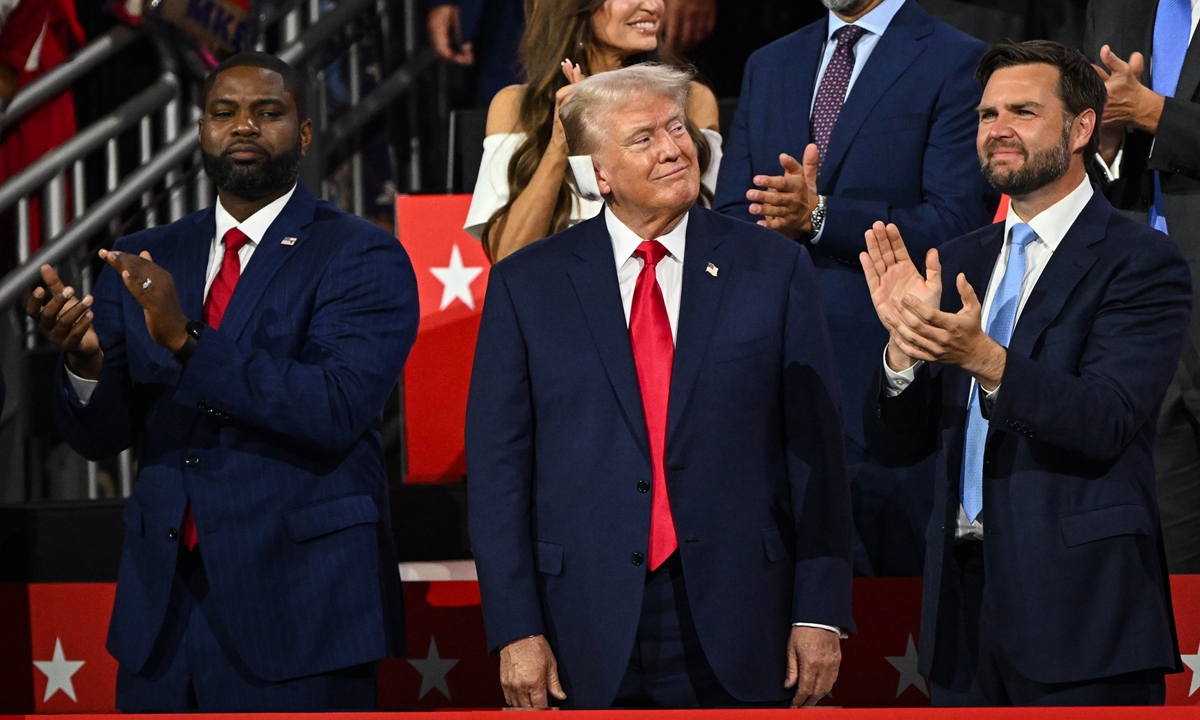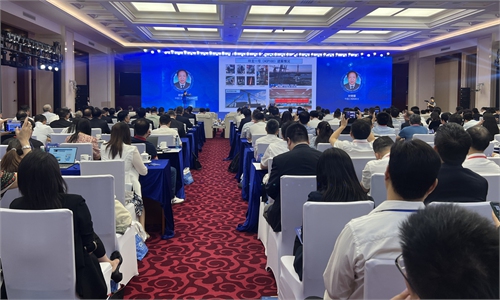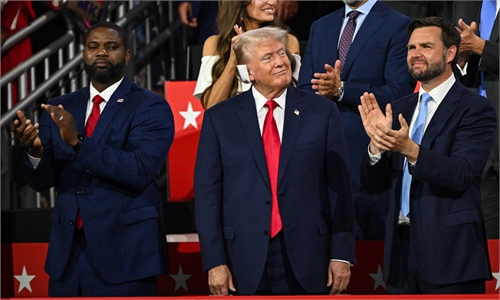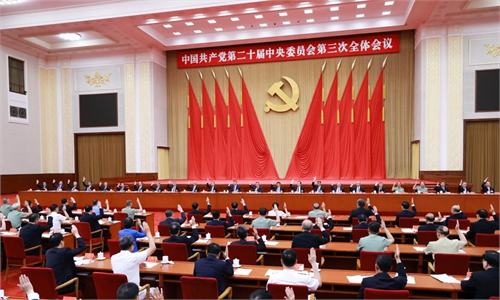Vance's speech highlights 'deeply rooted misconceptions about China'
Statement shows inward tendency, aversion to globalization: experts

Republican presidential candidate Donald Trump with his ear bandaged, his running mate JD Vance (right) and Florida Representative Byron Donalds appear at the Republican National Convention on July 15, 2024 in Milwaukee, Wisconsin. Photo: VCG
Speaking at the Republican National Convention, Donald Trump's running mate J.D. Vance repeatedly mentioned China, casting blame for US wage losses on China's efforts to build its own middle class. This type of rhetoric hyping the "China threat" is little more than a cliché given Vance's limited experience in foreign policy, but served to highlight the extreme misconception of China among US politicians, analysts said.
On Wednesday night, Senator Vance of Ohio made his national debut at the Republican National Convention, officially accepting the vice-presidential nomination. He praised Trump, highlighted his "Hillbilly Elegy" roots, criticized "Wall Street barons" and attacked US President Joe Biden.
In his 36-minute speech, Vance mentioned China on several occasions, claiming that the US had been flooded with "cheap Chinese goods" and warning of the threat of "deadly Chinese fentanyl" over the decades to come. While criticizing Biden, Vance also linked Biden policies to China, asserting that Biden gave China a "sweetheart trade deal" that destroyed American middle-class manufacturing jobs.
In his speech, Vance mainly focused on domestic issues, given his engagement in foreign affairs has been limited, he only briefly addressed a few international matters. His rhetoric on China, which largely emphasized the so-called "China threat theory," echoed previous Republican narratives without elaborating on detailed policies regarding China, Diao Daming, a professor from Renmin University of China, told the Global Times on Thursday.
Vance's speech displays a clear inward or insular tendency, reflecting his aversion to economic globalization. This attitude seems to align with the basic political views of Trump and his team. Vance's remarks also indicate that some Republicans continue to strongly advocate for the continuation of strategic competition with China, with a more pronounced confrontational stance, said Diao.
"Currently, we do not wish to judge the specific US policies toward China or foreign policy positions through events like the Republican National Convention," Lü Xiang, research fellow at the Chinese Academy of Social Sciences, told the Global Times.
However, given the overall atmosphere in the American electorate, their attitude toward containing China is becoming increasingly intense, which is something we do not want to see. Such attitude is not only detrimental to China-US relations but also to global peace and development, Lü said.
The US should focus more on addressing its own developmental issues. Individuals like Vance, who grew up in impoverished areas, have deep concerns for their own communities. Although the US claims to be number one in the world, its developmental problems have been obscured by political myths, leaving numerous Americans still struggling, the expert noted.
Instead of falling into zero-sum or negative-sum games, the US should seek win-win opportunities by collaborating with other countries, Lü said, noting that if the next US government can confront its own problems and correct its extremely misguided perceptions of China, there remains the possibility for cooperation between the two countries.
Vance is considered one of the "Asia First" Republican politicians who aim to shift US focus away from Europe and redirect the country's resources toward countering China's rise. For example, In February, at the Munich Security Conference, Vance argued that the US can't simultaneously support Ukraine, the Middle East, and be ready for contingencies in East Asia.
Moreover, while delivering a speech at the Quincy Institute for Responsible Statecraft in May, Vance stated, "I do not think that it is in America's interest to continue to fund an effectively never-ending war in Ukraine," according to media reports.
Europe is closely watching the current US election with growing anxiety, worried that if Trump is re-elected, the US might leave Europe to handle the mess of the Russia-Ukraine conflict alone and the future of US-Europe relations will be fraught with uncertainty, analysts said.
Lü said that the US has been working to draw Europe into the Indo-Pacific region, aiming to involve NATO in Asia-Pacific conflicts, which also adds to European uncertainty. Additionally, Europe is currently in a difficult and challenging period, with many national leaders in a weak political position, including Germany and France.
The US alliance system is facing severe tests. If Trump is re-elected, he is unlikely to outright declare certain countries "out" as he did during his previous term, but he might push US allies to act as cannon fodder for American interests, creating even greater discomfort among them, Lü said.
With more than 100 days remaining before the US votes, a growing list of uncertainties make it difficult to predict the outcome. And the world, including China and Europe, is preparing to deal with the potential challenges brought about by the election results, observers noted.



